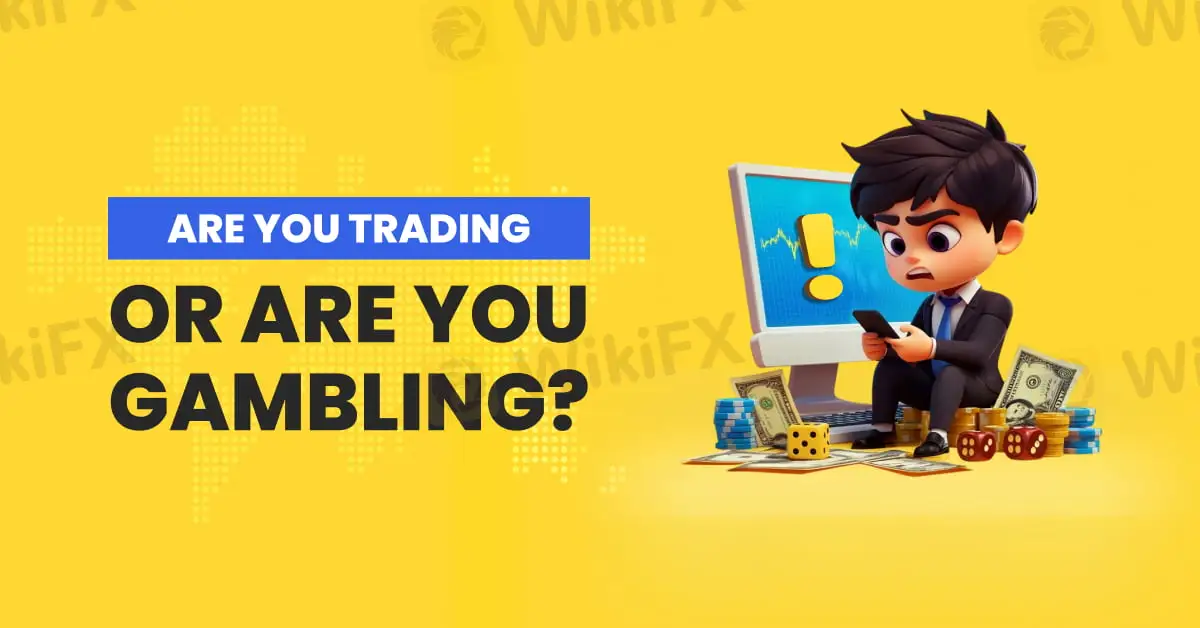简体中文
繁體中文
English
Pусский
日本語
ภาษาไทย
Tiếng Việt
Bahasa Indonesia
Español
हिन्दी
Filippiiniläinen
Français
Deutsch
Português
Türkçe
한국어
العربية
Are You Trading or Are You Gambling?
Abstract:In today’s world of online markets, it’s easy to confuse trading with gambling. And the truth is, many people who think they are trading are actually gambling without realising it.

In today‘s world of online markets, it’s easy to confuse trading with gambling. The two may look similar on the surface, as both involve risk and the chance of winning or losing money. But in reality, they are very different activities. And the truth is, many people who think they are trading are actually gambling without realising it.
Trading, when done properly, is based on a plan. Traders study the market, use a clear strategy, and manage their risk. They make decisions based on research and experience. Gambling, on the other hand, is based on luck. Gamblers take chances without a proven method, hoping things will go their way.
Sadly, many new traders behave more like gamblers. They jump into trades without a tested system. They take big risks, hoping to make quick money. Often, they follow hype on social media or fall for promises made by unregulated brokers. These brokers claim you can get rich fast, but in most cases, the only ones getting rich are the brokers themselves.
If you are trading without a clear, tested strategy or if you dont have a plan to protect your money, then you are not really trading. You are gambling.
A serious trader always knows how much they are risking. They never bet more than they can afford to lose. They follow rules for when to enter a trade, when to exit, and how much to risk. They review their performance and keep learning.
A gambler, however, acts on impulse. They trade out of boredom, fear of missing out, or the need to recover from a loss. They often increase their position size after losing, hoping to win it back. This behaviour can quickly lead to disaster.
Its also important to watch out for so-called investment opportunities that promise fast and easy profits. These are often scams. Real trading takes time, patience, and discipline. There are no shortcuts.

If you answered “no” to any of these, it may be time to step back and reassess. Trading without a system and risk control is no different from rolling the dice at a casino.
The markets offer real opportunities. But to succeed, you must treat trading like a business, not a game. Build a plan. Stick to it. Protect your capital. Because if you trade like a gambler, the outcome is usually the same: losses and regret.

Disclaimer:
The views in this article only represent the author's personal views, and do not constitute investment advice on this platform. This platform does not guarantee the accuracy, completeness and timeliness of the information in the article, and will not be liable for any loss caused by the use of or reliance on the information in the article.
Read more

Spot vs Forward Contracts - Which Should You Choose?
Mulling foreign exchange contract options - Spot vs Forward - to begin or consolidate your trading journey? Read this comprehensive guide explaining the differences between spot and forward contracts. You can select better using it.

Currency Hedging Practices and How They Protect Traders' Interests
Forex trading is a happening place with massive currency trading for all five days of a week from Monday to Friday. You can't rule out losses while there are potentially high gains. That’s why smart traders employ effective currency hedging practices to offset losses. It can be your go-to method to deal with sudden price fluctuations that define the forex market. Read on to learn smart forex trading tactics.

A Guide to Intraday Forex Trading You Can't Miss Out
Intraday trading where everything happens in a day fascinates millions around India and worldwide. The drama, the hype, and the ups and downs resulting from those are nothing short of an adventure. Read this guide to ace the forex intraday trading game.

Top Forex Trading Strategies Every Trader Must Implement
Successfully navigating the fluctuating forex market landscape requires more than having a high-risk appetite. It requires effective strategies that assure you gains even during the market fall. Let’s go through the strategies many traders implement to gain.
WikiFX Broker
Latest News
IronFX Broker Review 2025: A Comprehensive Analysis of Trustworthiness and Performance
OctaFX Flagged by Malaysian Authorities
OctaFX and XM Trading Platforms to Be Blocked in Singapore
Nonfarm Data Lifts Market Sentiment, U.S. Stocks Rebound Strongly
ATFX Opens New Office in Cape Town's Portside Tower to Expand in Africa
Tighter Scrutiny: Finfluencers Face Global Crackdown Amid Rising Risks
Interactive Brokers Enhances PortfolioAnalyst with New Features
2025 Broker Real - World Reviews: Share Your Insights & Grab Thousands in Rewards!
IronFX: A Closer Look at Its Licences
Eid ul Adha Celebration Continues – Grab the STARTRADER Offer Now!
Currency Calculator


